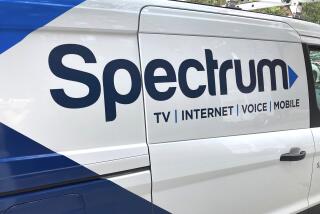Bridge Over the Superhighway
- Share via
Katie Williams used to drum on her desk while surfing Web sites on crafts, waiting for images to creep through her modem.
Now, the pictures pop up almost instantly -- and she didn’t have to pay a lot for the improvements.
Internet service providers EarthLink Inc. and United Online Inc., the Westlake Village firm that runs NetZero and Juno, began offering faster dial-up services this spring. They charge an extra fee, though EarthLink said earlier this month that it would drop the fee by September, matching a free offering that America Online will unveil in a few weeks.
Williams, an Albuquerque homemaker who uses NetZero, doesn’t mind that she’s not getting the full benefits of pricier broadband services such as cable and DSL.
“For the price that I’m paying,” Williams said, “it gives me all that I need.”
Modems kept getting faster through the 1990s, but the limits of physics stalled further improvements. Providers are getting around those limitations by using software to reduce the information required to produce a Web page.
Imagine a photo of a park. Instead of having to send lots of data to represent the grass, the software sends a green pixel once and tells the computer that an entire section is green. Same goes for the blue sky.
Images are blurrier but Web surfers can usually get clearer versions by right-clicking them.
The software, called accelerators, also improves the browser’s cache -- its local storage -- so logos, graphics and even text blocks don’t have to be downloaded again with repeat visits to a Web site.
The accelerator from a small Internet service provider, CoreComm, even scans the programming code of a Web page, looking for tweaks.
“If there are three spaces in a row that a browser is going to display as one, we might as well turn that into one space,” said Matt Holtz, CoreComm’s manager of systems engineering. “A lot of [hidden] comments in the code can be removed.”
The accelerator offerings are seen both as a way to retain dial-up customers and, for dial-up providers that also offer broadband, a way to ease subscribers into the higher-speed, higher-priced service.
“It will help extend the life of the existing dial-up base,” said Lydia Leong, an analyst with Gartner, a Stamford, Conn., research firm.
The tricks only go so far, and nothing beats widening the data pipeline as broadband services do. The accelerators generally work only with Web pages, not with e-mail unless it is a Web-based account. Downloading software, music and movies won’t get faster, either.
And although these services promise surfing as much as five times faster than normal dial-up speeds, it’s still considerably slower than broadband.
“It isn’t meant to be a substitute,” said Mark Griffith, director of brand marketing for Atlanta-based EarthLink.
But some areas are not served by DSL or cable. Dayton, Ohio, photographer Aulay Carlson said CoreComm’s accelerator offers small improvements that “add up over a month or so.”
Others, like Williams, want speed without the price tag. Her NetZero HiSpeed service costs $14.95 a month, $5 more than the regular service but half the price of the least expensive broadband plans.
“Broadband providers have gotten many people intoxicated on the notion of speed, but there’s a disconnect between the desire for speed and the willingness to pay,” said Mark Goldston, chairman and chief executive of United Online. “We become a stopover point.”
EarthLink said about 25,000 people have signed up for its accelerator. CoreComm estimated usage at about 20% of new subscribers. United would not release numbers.
Analysts doubt the services will catch on widely, noting that broadband prices are coming down in many markets. Verizon, for instance, now offers DSL for $35 a month, or $30 when bundled with phone services. SBC Yahoo DSL starts at $30 for the first year.
EarthLink’s accelerated service costs $29 but will drop by $7 in coming weeks.
Dave Burstein, editor of the online newsletter DSLPrime, says the cost of an extra phone line eliminates any savings.
Nonetheless, research from the Pew Internet and American Life Project suggests that 46% of veteran dial-up users have no interest in switching.
At America Online, where subscriber levels have dropped by hundreds of thousands in recent months, the accelerator is seen as a way to keep its dial-up service competitive.
“Consumers will migrate to broadband and when they migrate to broadband, we’ll be there,” said Jeff Kimball, vice president of AOL products for AOL Time Warner Inc. But in the meantime, the “AOLTopSpeed” acceleration software built into the online service’s newest software will offer “the best dial-up service available anywhere.”






